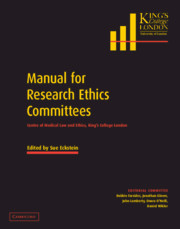Book contents
- Frontmatter
- Contents
- Editorial board
- Acknowledgements
- List of contributors
- Introduction
- Part I
- 1 The ethics of clinical research
- 2 Research ethics committees and the law
- 3 The regulation of medical research: a historical overview
- 4 The regulation of medical research in the UK
- 5 Observational and epidemiological research
- 6 Social survey research
- 7 Approaching qualitative research
- 8 Complementary and alternative medicine: challenges for research ethics committees
- 9 The ethical review of student research in the context of the governance arrangements for research ethics committees
- 10 The ethics of genetic research
- 11 Research or audit?
- 12 Randomised controlled trials
- 13 Determining the study size
- 14 Risk assessment for research participants
- 15 Absorbed radiation in patient and volunteer studies submitted to the ethical committee: a memorandum
- 16 A guide to the use of radioactive materials and radiological procedures for research purposes
- 17 Indemnity in medical research
- 18 The prevention and management of fraud and misconduct: the role of the LREC
- 19 Understanding clinical trials: a model for providing information to potential participants
- 20 The law relating to consent
- 21 Writing information for potential research participants
- 22 The law relating to confidentiality
- 23 Research involving vulnerable participants: some ethical issues
- 24 The ethics of research related to healthcare in developing countries
- Part II
- Index
14 - Risk assessment for research participants
Published online by Cambridge University Press: 08 January 2010
- Frontmatter
- Contents
- Editorial board
- Acknowledgements
- List of contributors
- Introduction
- Part I
- 1 The ethics of clinical research
- 2 Research ethics committees and the law
- 3 The regulation of medical research: a historical overview
- 4 The regulation of medical research in the UK
- 5 Observational and epidemiological research
- 6 Social survey research
- 7 Approaching qualitative research
- 8 Complementary and alternative medicine: challenges for research ethics committees
- 9 The ethical review of student research in the context of the governance arrangements for research ethics committees
- 10 The ethics of genetic research
- 11 Research or audit?
- 12 Randomised controlled trials
- 13 Determining the study size
- 14 Risk assessment for research participants
- 15 Absorbed radiation in patient and volunteer studies submitted to the ethical committee: a memorandum
- 16 A guide to the use of radioactive materials and radiological procedures for research purposes
- 17 Indemnity in medical research
- 18 The prevention and management of fraud and misconduct: the role of the LREC
- 19 Understanding clinical trials: a model for providing information to potential participants
- 20 The law relating to consent
- 21 Writing information for potential research participants
- 22 The law relating to confidentiality
- 23 Research involving vulnerable participants: some ethical issues
- 24 The ethics of research related to healthcare in developing countries
- Part II
- Index
Summary
This chapter tries to provide a way by which research participants can assess the risks of being involved in a particular research project. At the heart of the process will be the balance and a judgement made by the individual between the perceived benefits of the research and the possible risks.
Uncertainty is a key word in the assessment of risk. It should also be noted that any potential benefits may not be for the person taking part in the research, but for subsequent patients and/or populations. By definition, carrying out research means that the outcome is not known and thus potential benefits and risks not known. If they were clear, the procedure, treatment, intervention, would be classified as good practice, not research, as the risks would have been already assessed. It is thus difficult to assess the risks of taking part in a research project as much is unknown. This section can only give an indication of the terms and language used and the kinds of issues which might be considered by people before taking part in a research project.
Some definitions
Before considering some of the possible categories of risk, it is worth being clear about what certain terms mean.
(a) A hazard is any set of circumstances that may have harmful consequences.
(b) The risk is the probability of the hazard causing an adverse effect.
Thus a hazard, such as a drug, is not a risk until it is administered. The risk, the probability of an adverse effect occurring, will depend on various factors including the nature of the drug itself, the dose, the condition of the patient, and many others.
- Type
- Chapter
- Information
- Manual for Research Ethics CommitteesCentre of Medical Law and Ethics, King's College London, pp. 67 - 68Publisher: Cambridge University PressPrint publication year: 2003



